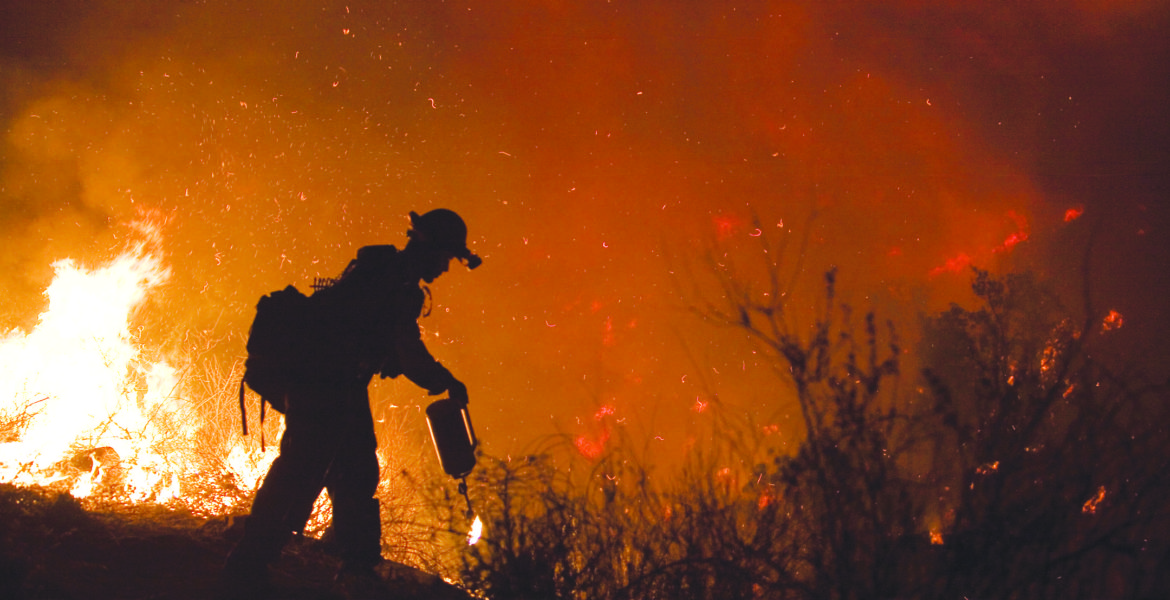COUNTY REPORTS SUICIDE RATES FOR FIRST RESPONDERS ARE RISING AT AN ALARMING RATE, WITH WILDLAND FIREFIGHTERS AT HIGH RISK.
Above, fire crew member fighting Poomoocha wildfire in California. Photo by FEMA
The Los Angeles County Board of Supervisors has moved to address a troubling increase in the suicide rate among first responders.
The motion was passed on the 17th anniversary of 9/11. Supervisor Ridley Thomas commended Supervisors Kathryn Barger and Janice Hahn, for bringing the issue to the board.
“Addressing the mental health and wellbeing of those on the front lines is critically important and a good way to honor the heroism of the public servants who responded to the call for help on 9/11,” Ridley-Thomas stated.
The Board of Supervisors unanimously passed a motion by Barger, co-authored by Hahn, to review current policies, programs, and services that address suicide prevention, PTSD, secondary trauma and mental health care, as well as education and outreach for first responders, emergency room personnel and crime scene personnel.
“A recent report by the Ruderman Family Foundation says it all: the number of firefighters and law enforcement officers who took their own lives outnumbered all line-of-duty deaths in 2017,” Ridley-Thomas said. “Suicide is just one of many troubling outcomes linked to the traumatic experiences of our first responders and emergency professionals. Depression and substance abuse are others.”
Recent data indicates that while suicide rates appear to be increasing at a rapid rate among all first responders, wildland firefighters, stretched to the limits by increasingly catastrophic disasters and year-round fire season, currently have one of the highest suicide rates in the first responder community.
“These brave men and women face extremely tough situations every day, sacrificing so much to save the lives of others—they deserve our help to save theirs,” said Barger.
She pointed to the Ruderman Family Foundation report that found that not enough agencies have programs and policies in place to address suicide prevention: “Silence can be deadly, because it is interpreted as a lack of acceptance…that prevents first responders from accessing potentially life-saving mental health services.”
“The situations our first responders are asked to respond to can be horrific and their experiences can have lifelong effects,” said Hahn. “We need to ask ourselves, ‘What can we do to support our first responders and how can we get them the services they need?’”
The motion calls for the county’s chief executive officer to work with county agencies and other relevant stakeholders and report back to the Board of Supervisors in 90 days.
The report is expected to include “a collaborative and comprehensive plan to address and mitigate mental health issues and suicide among first responders resulting from job-related stress and trauma.”
“Now, we have an opportunity to apply these same principles to support those who serve us,” Ridley-Thomas said. “When our first responders are taken care of, it not only impacts their health and their families—it also impacts the service they provide to county residents.”



First of all: a huge thank you to all first responders who put their lives on the line all the time to keep us safe!
Secondly: what will the measures be to help these brave people? – Reactionary only? Or also preventative, such as meditation, yoga, mindfulness-training, books like Eckhart Tolle’s “The Power of Now”? Nutrition-coaching to reduce craving and substance abuse and cut the dependency on caffein and industrial sugars? Installing juicebars in/near firestations for super fresh nutritious drinks? Support for heavy-metal and toxic waste detox from their bodies to keep them healthy and sane? The options are seemingly endless… – Don’t get me wrong, I think there are a lot things that first responders need after a mission. But there’s also tons of things that can be done habitually to increase stress-resistance and even change the structure of the brain.